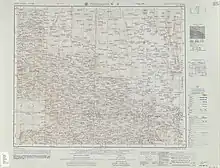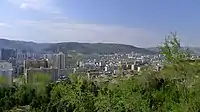Pingliang
平凉市 | |
|---|---|
 The Kongtong Mountains in Pingliang | |
.png.webp) Location of Pingliang City jurisdiction in Gansu | |
| Coordinates (Pingliang municipal government): 35°32′33″N 106°39′54″E / 35.5424°N 106.6649°E | |
| Country | People's Republic of China |
| Province | Gansu |
| Municipal seat | Kongtong District |
| Area | |
| • Prefecture-level city | 11,196.71 km2 (4,323.07 sq mi) |
| Elevation | 1,398 m (4,587 ft) |
| Highest elevation | 2,857 m (9,373 ft) |
| Lowest elevation | 890 m (2,920 ft) |
| Population | |
| • Prefecture-level city | 1,848,607 |
| • Density | 170/km2 (430/sq mi) |
| • Metro | 871,600 |
| Time zone | UTC+8 (China Standard) |
| Postal code | 744000 |
| Area code | 0933 |
| ISO 3166 code | CN-GS-08 |
| Licence plate prefixes | 甘L |
| Website | www |
Pingliang (simplified Chinese: 平凉; traditional Chinese: 平涼; pinyin: Píngliàng; lit. 'Pacify Liang"') is a prefecture-level city in eastern Gansu province, China, bordering Shaanxi province to the south and east and the Ningxia Hui Autonomous Region to the north. The city was established in 376 AD.[1] It has a residential population of 2,125,300 in 2019.[1] The urban population is almost 900,000.[3]
Pingliang is well known for the nearby Kongtong Mountains, which are sacred to Taoism and location of the mythical meeting place of the Yellow Emperor and Guangchengzi, an immortal.
List of divisions

| Map | ||||||
|---|---|---|---|---|---|---|
| Name | Chinese | Hanyu Pinyin | Population (2010) |
Area (km²) | Density (/km²) | |
| Kongtong District | 崆峒区 | Kōngtóng Qū | 504,848 | 1,936 | 261 | |
| Huating City | 华亭市 | Huátíng Shì | 189,333 | 1,183 | 160 | |
| Jingchuan County | 泾川县 | Jīngchuān Xiàn | 281,145 | 1,409 | 200 | |
| Lingtai County | 灵台县 | Língtái Xiàn | 183,937 | 2,038 | 88 | |
| Chongxin County | 崇信县 | Chóngxìn Xiàn | 102,116 | 852 | 120 | |
| Zhuanglang County | 庄浪县 | Zhuānglàng Xiàn | 382,827 | 1,558 | 246 | |
| Jingning County | 静宁县 | Jìngníng Xiàn | 423,827 | 2,193 | 193 | |
Geography
Pingliang ranges in latitude from 34° 54' to 35° 46' N and in longitude from 105° 20' to 107° 51' E. Bordering prefecture-level cities are Xianyang (Shaanxi) to the east, Baoji (Shaanxi) and Tianshui to the south, Dingxi and Baiyin to the west, and Guyuan (Ningxia) and Qingyang to the north. It is located on the Loess Plateau with elevations ranging from 890 to 2,957 metres (2,920 to 9,701 ft); the city proper itself is at an elevation of around 1,400 m (4,590 ft).
Due to its elevation of around 1,400 m (4,590 ft), Pingliang has a monsoon-influenced, four-season, humid continental climate (Köppen Dwb), with cold but dry winters, and warm and humid summers. The monthly 24-hour average temperature ranges from −4.2 °C (24.4 °F) in January to 21.5 °C (70.7 °F) in July. Much of the annual rainfall occurs from June to September, and the annual mean temperature is 9.28 °C (48.7 °F). With monthly percent possible sunshine ranging from 46% in September to 65% in December, the city receives 2,381 hours of bright sunshine annually.
| Climate data for Pingliang (Kongtong District, 1981–2010 normals) | |||||||||||||
|---|---|---|---|---|---|---|---|---|---|---|---|---|---|
| Month | Jan | Feb | Mar | Apr | May | Jun | Jul | Aug | Sep | Oct | Nov | Dec | Year |
| Record high °C (°F) | 17.3 (63.1) |
23.4 (74.1) |
28.4 (83.1) |
32.6 (90.7) |
33.4 (92.1) |
35.9 (96.6) |
36.0 (96.8) |
35.0 (95.0) |
33.8 (92.8) |
27.8 (82.0) |
22.8 (73.0) |
17.9 (64.2) |
36.0 (96.8) |
| Mean daily maximum °C (°F) | 2.4 (36.3) |
5.3 (41.5) |
11.0 (51.8) |
18.0 (64.4) |
22.6 (72.7) |
26.2 (79.2) |
27.5 (81.5) |
25.7 (78.3) |
20.9 (69.6) |
15.1 (59.2) |
9.5 (49.1) |
3.8 (38.8) |
15.7 (60.2) |
| Daily mean °C (°F) | −4.2 (24.4) |
−0.9 (30.4) |
4.4 (39.9) |
10.9 (51.6) |
15.8 (60.4) |
19.6 (67.3) |
21.5 (70.7) |
20.0 (68.0) |
15.2 (59.4) |
9.0 (48.2) |
2.7 (36.9) |
−2.7 (27.1) |
9.3 (48.7) |
| Mean daily minimum °C (°F) | −8.9 (16.0) |
−5.5 (22.1) |
−0.6 (30.9) |
4.9 (40.8) |
9.5 (49.1) |
13.4 (56.1) |
16.2 (61.2) |
15.3 (59.5) |
10.8 (51.4) |
4.6 (40.3) |
−2.0 (28.4) |
−7.2 (19.0) |
4.2 (39.6) |
| Record low °C (°F) | −22.5 (−8.5) |
−19.1 (−2.4) |
−15.2 (4.6) |
−8.8 (16.2) |
−1.5 (29.3) |
4.3 (39.7) |
8.7 (47.7) |
5.5 (41.9) |
−0.7 (30.7) |
−7.9 (17.8) |
−16.6 (2.1) |
−24.3 (−11.7) |
−24.3 (−11.7) |
| Average precipitation mm (inches) | 3.8 (0.15) |
6.0 (0.24) |
13.9 (0.55) |
26.3 (1.04) |
45.8 (1.80) |
64.9 (2.56) |
104.6 (4.12) |
98.5 (3.88) |
69.6 (2.74) |
37.2 (1.46) |
7.8 (0.31) |
2.2 (0.09) |
480.6 (18.94) |
| Average precipitation days (≥ 0.1 mm) | 3.6 | 5.0 | 6.7 | 7.9 | 9.6 | 10.7 | 12.4 | 12.9 | 11.5 | 9.2 | 4.6 | 2.4 | 96.5 |
| Average relative humidity (%) | 55 | 56 | 56 | 54 | 58 | 63 | 71 | 76 | 78 | 74 | 64 | 57 | 64 |
| Mean monthly sunshine hours | 192.8 | 164.8 | 177.5 | 211.7 | 237.8 | 233.0 | 229.8 | 216.6 | 168.7 | 173.1 | 180.0 | 195.2 | 2,381 |
| Percent possible sunshine | 62 | 54 | 48 | 54 | 55 | 54 | 52 | 52 | 46 | 50 | 58 | 65 | 54 |
| Source: China Meteorological Administration (precipitation days and sunshine 1971–2000)[4][5] | |||||||||||||
Transport
- G22 Qingdao–Lanzhou Expressway, which motorists can take to reach the south of neighbouring Ningxia and eventually Lanzhou, the capital of Gansu
- China National Highway 312, which motorists can take to reach Xi'an
Notable residents
- Zhao Jiping, film composer (b. 1945)
Notable births
Pingliang is the birthplace of Huangfu Mi, who wrote the first book on acupuncture,[6] of Niu Sengru, and of Southern Song dynasty generals Wu Jie (吴玠) and Wu Lin.[1]
References
- 1 2 3 4 "平凉概况 - 平凉概况-平凉市人民政府". Archived from the original on 2020-10-21.
- ↑ "2021年平凉市人口总人数口和第七次人口普查结果-红黑人口库2021年". www.hongheiku.com. Retrieved 2021-06-09.
- ↑ "人口民族". Archived from the original on 22 May 2019.
- ↑ 中国气象数据网 - WeatherBk Data (in Chinese (China)). China Meteorological Administration. Retrieved 2020-04-15.
- ↑ 中国地面国际交换站气候标准值月值数据集(1971-2000年). China Meteorological Administration. Archived from the original on 2013-09-21. Retrieved 2010-05-25.
- ↑ Ma, Kan-Wen (December 2000). "Acupuncture: Its Place in the History of Chinese Medicine" (PDF).




